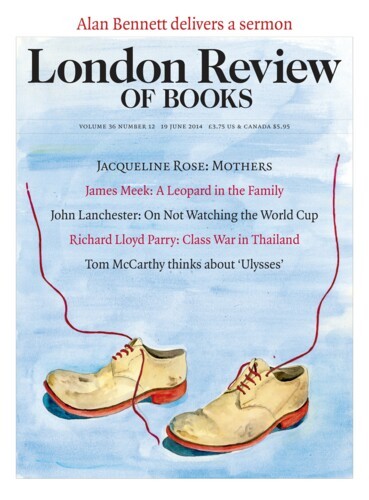The immigrant who arrives too late in life to adapt to his new country, but too early to survive on nostalgia for the old country, has to create a third, imagined country to live in. When my grandmother got Alzheimer’s I was tempted to see it as an expression of her late-life immigration from the USSR to the USA, leaving one civilisation and never arriving at the other. (I was a teenager.) One of her daughters had cut off her past and been reborn as an American; the other returned over and over to Russia, making documentaries, unearthing graves and exploring gulags so she was all ‘memory’. But my grandmother had neither future nor past. As her illness got worse she would be found walking dazed along the boardwalk in Brighton Beach, the Russian ghetto where Brooklyn meets the ocean, a last stop on the subway from Manhattan. In the evening the boardwalk would be full of Russian immigrants with gaudy haircuts and fur-wrap finery, and as the light faded you could forget you were in America.
Peter Pomerantsev
Peter Pomerantsev’s latest book, This Is Not Propaganda, won the 2020 Gordon Burn Prize.
‘When the news came in about the plane going down I couldn’t tell whether it was real. There have been so many fake pieces of news in the Russian media this week you can no longer tell what’s true and what isn't,’ B said, as we sat in a Moscow café the weekend after Malaysia Airlines flight MH17 had been blown out of the sky over Donbass. ‘Just this week there was a story about Ukrainian soldiers crucifying a Donbass child. Then there was a story about how the White House instructed the Ukrainians to depopulate Donbass so that the US can get control of its shale gas. And since the crash, there have been stories about Americans trying to down Putin’s plane but getting the Malaysian one by accident, or the plane being filled with corpses before it took off to fake the tragedy, or the US blowing up the plane to pull Putin into a war in Ukraine to distract from their economic problems.’
‘Will you be supporting England?’ English people have asked me ever since I can remember. My family moved to London from Kiev in 1980, when I was three. The question might look like a football version of Norman Tebbit’s ‘cricket test’. But one of the earliest things I worked out as an immigrant child is that you’re not meant to rush into English identity. You can do that in the US maybe, but it would be utterly un-English to try to be too English too fast. ‘Who do you support?’ is a bit of a trick question.
Diary: What fascists?
Peter Pomerantsev, 19 June 2014
When Putin’s holy war began Alexey checked himself into a psychiatric ward. He had come back to Russia in 2012 after working as a journalist in London, where we met (I had just moved to London after a decade in Moscow). The protests against Putin were cresting, and change seemed imminent. ‘London is boring, everything has already happened here,’ Alexey said. ‘Russia...
‘Russia,’ the Russian writer said, ‘is pitted against the West because of its deeper sense of spirituality.’ He was speaking at a conference in Kiev bringing together ‘international intellectuals to carry out a discussion about the meaning of Ukrainian pluralism for Europe, Russia and the world’. It was hot in the room. I felt sick and went down to Maidan, my first visit since the revolution.
Podcasts & Videos
Peter Pomerantsev, Marina Hyde and Carl Miller: This is Not Propaganda
Peter Pomerantsev
Peter Pomerantsev’s latest book, This is Not Propaganda, travels the world to investigate why we can no longer believe what we say, or say what we believe. He talks about here with Marina Hyde and Carl...
Diary: European Schools
Peter Pomerantsev
Peter Pomerantsev reads his diary about his time in the 'English section' at the European School in Munich.
Diary: Iammmmyookkraaanian
Peter Pomerantsev
Peter Pomerantsev reads his piece on the images and myths of Maidan.
Read anywhere with the London Review of Books app, available now from the App Store for Apple devices, Google Play for Android devices and Amazon for your Kindle Fire.
Sign up to our newsletter
For highlights from the latest issue, our archive and the blog, as well as news, events and exclusive promotions.


